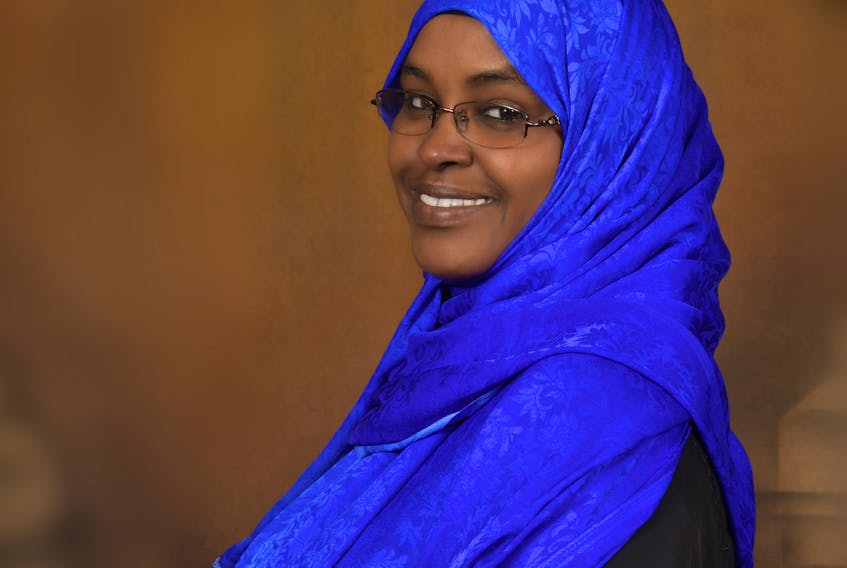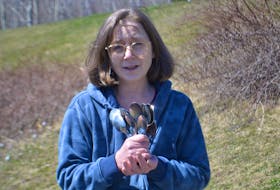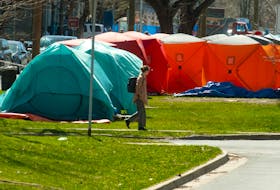ST. JOHN'S, N.L. — It’s an age when girls are excited about playing outside, finding new friends and losing their first baby teeth.
But when Maryam Sheikh was six years old, she was taken to a secluded outdoor area and had her genitals cut and removed.
More than 40 years later, she can recall the agony like it was yesterday.
“It was awful. It’s something that’s difficult to describe, it was so painful,” she said.
“The blood was gushing. To this day, if I smell blood, I get nauseated. It brings me back to that day.”
Growing up in the small village of Garissa in northeastern Kenya, Sheikh is one of about 200 million girls and women alive today in the world who have been subjected to female genital mutilation (FGM) — the practice of partially or totally removing the external female genitalia or injuring the female genital organs for non-medical reasons.
"It was awful. It’s something that’s difficult to describe, it was so painful. The blood was gushing. To this day, if I smell blood, I get nauseated. It brings me back to that day.” — Maryam Sheikh
There are no health benefits to it. Yet, for decades it’s been a common practice in many countries, mainly in western, eastern and northeastern regions of Africa and some countries in the Middle East and Asia.
According to the World Health Organization, more than 3 million girls between infancy and the age of 15 are at risk of FGM annually. That’s based on data from 30 countries where population data exists. However, advocates against the practice say the numbers are closer to 4.1 million girls in 92 countries.
Considered one of the cruellest, most degrading and harmful organized practices against females, it’s socially and culturally ingrained, with the belief that it makes a girl “clean” and increases her prospects of marriage. It’s seen as a way to maintain a girl’s sexual modesty and ensure she will remain “wholesome” before marriage.
The process is mostly carried out by traditional cutters, who use unsanitary knives, razor blades or scissors with no anesthetic, which has proven to have harmful effects and health risks.
Girls can suffer urinary or vaginal problems and, later, painful intercourse, menstrual blockage, urinary blockage, cysts, complications during childbirth, infection, septicemia and even death. It can also cause severe depression and post-traumatic stress syndrome. Treatment of health complications costs billions per year.
“They tell you to be brave, but no one could have prepared me for the pain,” said Sheikh, who recalls being told to shower before being led out to the bush by her older cousin.
“I’ll never forget the first drop of urine and how painful that was. It burned so much. I can’t explain the pain. … It took weeks to heal … and I was sore for years later.”
We need to end the 🇨🇦 silence!
— EndFGMCanada (@CanadaFgm) February 10, 2021
We need the Canadian government, civil society, and stakeholder to step up on female genital mutilation and support survivors and protect girls.
Watch our historic webinar and learn why. #EndFGM #MyIssueTooCanada
https://t.co/qRLkkBHZ6P
The next generation
When Sheikh had a daughter of her own, she knew she had to get out of the country to save her from the same torturous fate.
“She’d come to me and say, ‘Mommy, I don’t want to be next,’” said Sheikh, whose daughter, Khadija, is 10 years old. “And even if could protect her from the physical cut, I couldn’t protect her from the shaming (if she wasn’t cut). It was really getting to me.
“I think the last thing that pushed me was when my mother came to me and asked me, ‘What will you do if your daughter is cut?’ That was a wakeup call. … It was like knowing in your heart there’s a cobra when you don’t know how or when it will strike.
“For me, it was too much. There was so much fear. I (realized) she can’t grow up like that.”
The 49-year-old — a single mother who also has a 17-year-old son, Luqman — moved to St. John’s with her children in September 2019.
In October 2020, she graduated from Memorial University. She works at a supermarket, but plans to pursue a doctorate in anthropology.
Sheikh is one of many people around the world who are speaking out against FGM.
“Women have no voice and suffer in silence,” she said. “I want to use my voice to help others because I don’t want another girl to go through what I went through.
“We need to seek true healing because we deserve to have a meaningful life. We don’t need to be in denial, to be ashamed or feel like we’re betraying our cultures.”

An ally
Giselle Portenier has dedicated much of her career to raising awareness about the plight of thousands of women and girls in Canada who are survivors of FGM.
An acclaimed human rights journalist and filmmaker, Portenier is also co-founder of the End FGM Canada Network, a non-partisan group working to end female genital mutilation and cutting in both Canada and abroad.
“It is the worst systematic human rights abuse committed against girls in the world today,” Portenier recently told The Telegram in an interview from her home in Vancouver. “Every 10 seconds, another girl is cut somewhere.
“There are different types of FGM, but no type leaves the girl unscarred, physically or emotionally,” she said.
With thousands of immigrants coming to Canada from 56 countries where FGM has been a long-standing practice, FGM is not just an issue abroad, she said.
There are more than 100,000 survivors in Canada, she said.
The End FGM Canada Network has been urging the Canadian government for years to acknowledge it’s an issue here and to create a national action plan to support survivors and protect girls at risk in Canada.
“Unlike other countries, in Canada, we appear to have no protocol to protect girls at risk and there are few supports for survivors,” said Portenier, whose latest documentary, “In the Name of Your Daughter,” features Tanzanian children who risk everything to escape FGM.
Suppose the tongue was being cut- coz society felt girls shouldn’t speak, or eat or that it was ugly thus the mouth was beautified by getting rid of the tongue etc, would we have accepted? Become academic with it? Would we be unconcerned? Why are we not angry enough about FGM?
— The Maryam Sheikh (@MaryamDeeqa) February 29, 2020
Toothless law
Portenier said while Canada has had a law banning FGM since 1997, there have been no prosecutions.
“That’s despite the fact that there’s evidence there are girls living in Canada being victim to FGM,” said Portenier, adding that there’s evidence girls are being taken out of Canada to be cut and that cutters are also coming in.
“We need to enforce those laws in Canada.”
It’s people like Sheikh who are helping the charge against FGM.
“Maryam has shown a lot of courage. … She is fierce,” Portenier said.
“I believe there is a real deep silence in Canada on female genital mutilation, partly because we’re all too polite and afraid we’ll be called racist if we talk about it.
“So, Maryam is just what the doctor ordered to help break that silence.”
Rosie Mullaley is a reporter in St. John’s.









